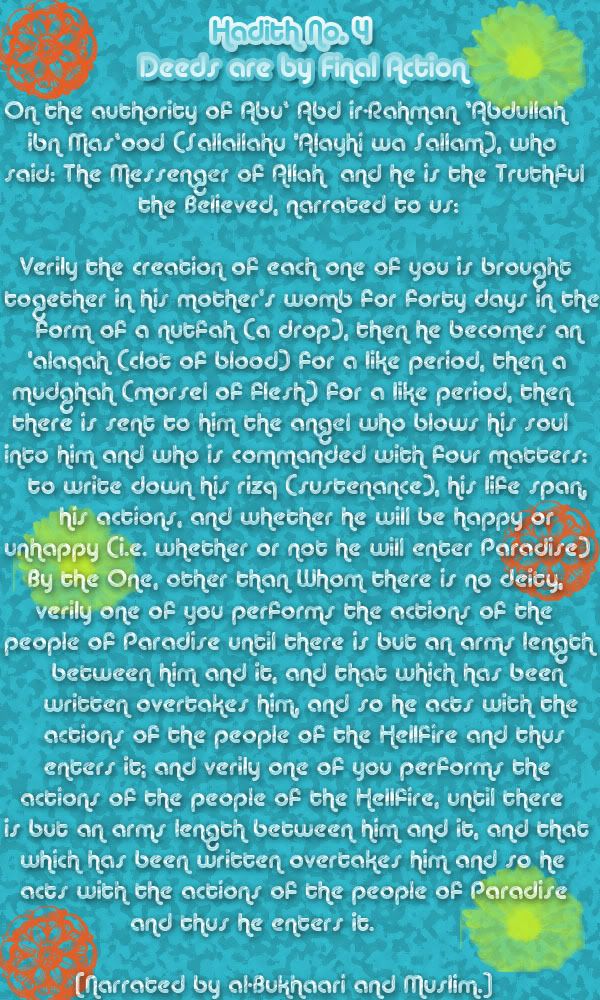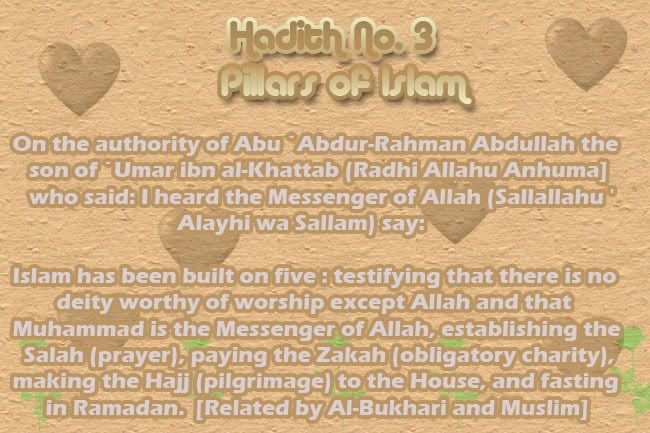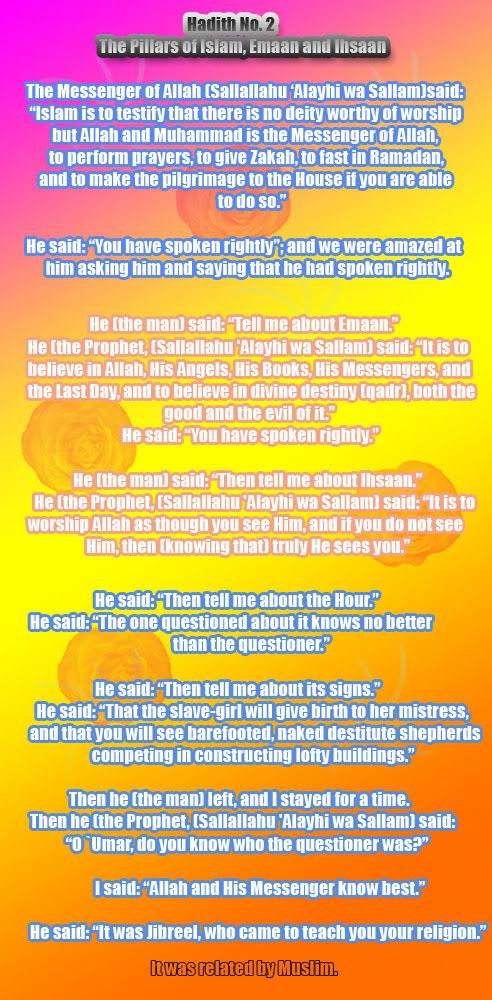 http://fortyhadith.iiu.edu.my/hadith04.htm
http://fortyhadith.iiu.edu.my/hadith04.htmBackground
This hadith was not only recorded by Al-Bukhari and Muslim but by other Scholars as well. Apart from 'Abdullah bin Mas'ud, this hadith was also narrated by many other companions (Sahabahs).
This narration by 'Abdullah bin Mas'ud was recorded with different versions where some words/terms conflicted with each other, resulting in different versions having different meanings regarding Creation. The conflicts are as follows:
1. The addition of the word "nutfah" (the drop of a fluid)
This word is not mentioned in Bukhari neither Muslim's narration. However it was added to other narrations including the one chosen by al-Imam al-Nawawi to provide a better interpretation or explanation but instead it gave two conflicting views of the creation of mankind in terms of stages of the fetus:
First View:
The three stages of the fetus consist of forty days each, equaling to a total of 120 days for the stages to complete. It is only after this 120 days that the ruh (spirit) is breathed into the fetus, as well as the recording of the fetus' provision life span, deeds and destiny. This view, the inclusion of the word "nuftah", is the view held by the majority of the Scholars.
One problem with this view is that the stages of the fetus as interpreted in this hadith contradict the facts proven by science today.
Another problem concerns the Fatwa on abortion. Scholars say that abortion is allowed (provided there is a very good reason - e.g. the woman's life is in danger) only before the ruh is breathed into the fetus, i.e. before 120 days - as opposed to 40 days if the second view is to be taken (see below).
Second View:
The word "nutfah" does not belong to the text of the hadith. This changes the meaning of the hadith which interprets the three stages of the fetus as taking place in the first forty days. This view correlates with scientific facts. And this means that the ruh is breathed into the fetus after forty days, and not 120 days. Consequently the Fatwa on abortion states that abortion is allowed only before forty days.
2. The authenticity of the last section of the Hadith
Some Scholars say that the last section of the hadith (i.e. "By Allah…) is not part of the text of the Prophet, sallallahu 'alayhi wasallam, but the words of 'Abdullah bin Mas'ud. But since the issue in this hadith is related to matters which we cannot perceive with our limited human perception, this last section is accepted and included here because 'Abdullah bin Mas'ud may have derived the meaning from another hadith of the Prophet, sallallahu 'alayhi wasallam, to explain this hadith better.
There are other hadiths collected by Al-Bukhari and Muslim, which touch on the same issue. But there are some differences between the texts of those hadiths and this one. Those hadiths narrate the Prophet, sallallahu 'alayhi wasallam, as saying: One of you will perform the acts of the people of the Paradise (Ahlul Jannah) as it appears in the eyes of the people.
This is like the Munafiqin or hypocrites - they do the acts of the Mua'minin. They appear, in our eyes, to be doing the acts of the Ahlul Jannah but Allah knows best. Their end will be a disaster - by being Munafiqin they are actually denying the message of God in their deep hearts as Allah mentioned in the Qur'an and their end will be in the Hellfire since they do not submit to Allah in their hearts. This explanation of the other hadiths is important in the understanding of this hadith.
Lessons
The Scholars say when we do a research on a concept or an issue mentioned in hadiths, we shouldn't depend on only one hadith - we need to search for other similar hadiths, which deal with the same issue/matter. We must remember that some narrators will narrate a hadith by its meaning, and not exactly as it was said by the Prophet, sallallahu 'alayhi wasallam. This is because being human, some of them may forget some of the exact words/terms used by the Prophet, sallallahu 'alayhi wasallam - but they still understand the actual meaning of what was said.
Then we need to compare the different texts of hadiths on the same issue with each other in order to have a more complete interpretation and better understanding of the issue/matter at hand.
Some people, on hearing this hadith as it is and without further explanation, might feel despair, fearing that they fall into the bad group of people mentioned. This will lead to determination (jabriah) - they may think that no matter what they do, if their end has already been written, then why should they bother to do good deeds. This is the wrong attitude to have as it is based on a wrong perception. Allah is Just. We should trust Allah. If we are good to Allah and trust Him, He will be good to us. We should be optimistic and not pessimistic. We follow Allah's commands and make the effort to be good Muslims and we should not despair.
During one of the battles, a companion (Sahabi) said to the Prophet, sallallahu 'alayhi wasallam, that he was following him, sallallahu 'alayhi wasallam, to fight in the hope that an arrow will be shot through his (the Sahabi's) neck, coming in from the front and going out the back. The Prophet, sallallahu 'alayhi wasallam, said, "If you are honest with Allah, Allah will be honest with you." The Sahabi died exactly as he hoped to.
The Prophet's, sallallahu 'alayhi wasallam, words here are generic and can be used for all situations. If we are honest with Allah, Allah will not leave us - He will help us - He will guide us, etc. The closer we are to Allah, the more He will help us and guide us. Thus, the last section of this hadith is an exception and applies only to few people such as the Munafiqin.
But this, on the other hand, does not mean that we live in hope alone. The Scholars say that we must combine hope with fear - when we worship Allah, we should have hope as well as fear of Him. Fearing Allah is a positive thing. The more we fear Allah, the closer we get to Him. The more we fear Allah, the more calm and at peace we will be. This is unlike the natural 'fear' where if we fear something, e.g. a fire or a dangerous animal, we will try to get away from it.
Scholars say that we should have an equal amount of hope to the amount of fear. This is so we will have a better status of Iman (faith) - there is no despair and at the same time there is no excessive hope (over-confidence) which could lead to laziness and the non-fulfillment of our obligations. This is why we need to combine hope and fear, as well as love Allah the most and have trust in Him.
This above hadith is about Allah's Creation and Qadar. The statement: "that which has been written will overtake him" should be understood in the positive sense and not negatively. Allah with His ultimate knowledge knows what will happen as it has been explained in the previous hadith.
Al-Qadar can be categorized as:
1. Al-Qadar al-Kulli - the general qadar which has been recorded by Allah in Al-Lauhulmahfudz or the Preserved Tablet.
2. Al-Qadar al-Sanawi - the annual qadar which takes place once a year (Lailatul qadar) - where it matches what has been written in Al-Lauhulmahfudz.
What has been written in Al-Lauhulmahfudz is only known to Allah. It is not revealed to us - we don't know about our destiny, what our rizq is, where we'll end up, etc. To us it is ghaib and unknown. The translation of this hadith using the word "overtake" may not give the true meaning if it were to be understood that whatever has been recorded by the angels will be "imposed" on a person's life. We are simply being told about Ilmu Allah or the ultimate knowledge of Allah. What has been written does not cause us to do what we do. It is not a cause and affect situation, as believed by many Muslims. Many Muslims believe that as it has already been written, therefore this will cause us to do whatever has been written. The truth is even though it has been written and even though we will do it, we will not do it because it has been written. It is actually an association, or a matching. What we are going to do matches the knowledge of Allah, because Allah's knowledge is ultimate. In other words, what we are going to do matches what has been written. This shows the glory of Allah, the ultimate knowledge of Allah. So we should not have the understanding that things are imposed on us. Otherwise this will nullify the whole concept of iman (faith) and the whole concept of Creation and all other related concepts.
We are responsible for what we choose and for what we do. Referring to the last section of this hadith where a person's final destiny changes at the last minute and he ends up not as expected, there are examples in the Sirahs where some people embrace Islam in the last minute - e.g. they embrace Islam and go into battle and die, some of them not having done a single good deed. There are also many examples today where non-practicing Muslims or those doing bad deeds, having reached the last stages of their lives (at the age of 50 or 60), will repent and turn into a good Muslim. The same applies for thousands of new converts every year. These people, according to the will of Allah, will be forgiven and enter Paradise.
For the other scenario where a person performs good deeds most of his/her life and at the end of his/her life perform bad deeds deserving to enter the Hellfire (as mentioned in the hadith), this situation affects only a limited number of people compared to the first one. And it is because of the person himself, such as in the case of hypocrites.
To have the correct understanding of the concept of qadar, we need to know more about the creation of the human being. What is mentioned in this Hadith is actually a miracle. It describes the stages of the fetus and the creation of man 1,400 years before science and technology confirm it as fact. (This description of the stages of the fetus can also be found in the Quran but without the mention of the periods of times.) In other words, scientists were only able to observe this phenomenon in the last few decades whereas it was already mentioned in the Qur'an and Hadith hundreds of years ago.
A conference regarding the Creation was held in Europe several years ago and some Muslim Scholars were invited to attend. When these Scholars gave the Islamic perspective regarding the stages of the fetus, showing that this was documented in the Quran and the Hadith, some of the people who attended the conference embraced Islam - they were convinced that it is a Divine revelation.
We also need to understand the components of the human being in order to help us understand qadar in the positive way. The human being consists of the following components: -
1. The intellect (Al-Aql) - this allows us, to a certain extent, to distinguish between good and evil. The intellect is part of us, part of the creation of Allah. Based on this, a person is regarded as mukallaf, responsible to understand and accept the massage of Allah if he is sane. If someone is mentally disturbed or insane, then he is not mukallaf.
2. The natural disposition or innate (Al-Fitrah) - we are created with this innate which enables us to love what is good and what is right and to hate what is evil and what is wrong. It consists of love and hate. Even though we are created with this fitrah, it is subject to change due to the environment, to our parents, upbringing, etc. Therefore there are people who might love what is bad due to a spoiled or a corrupted fitrah. The Scholars say the original fitrah is still there within these people - if we try to 'awaken' the fitrah, these people will come back to loving good and hating bad.
3. The commitment that we make, at the time of our pre-creation, to worship only Allah. This is related to the fitrah - it causes us to have this natural disposition or innate towards loving what is good and hating what is bad.
4. The willingness (Al-Iradah) and Power (Qudrah): Allah provided us with willingness and power/ability. An action cannot take place without this willingness and power - we do something only if we are willing and we have the power to do it. But this willingness and power are neutral and can be manipulated and used in either good or bad ways.
5. We have also been created with desires (shahawat) and the existence of these desires within us can manipulate our willingness or power towards good or bad.
Desires are part of what is known as the internal challenges - things which influence our willingness and ability. The internal challenges consist of:
1. Shahawat/Hawa (self desires)
2. Nafs, of which there are three different aspects:
A. The nafs which encourages us to do bad deeds
B. The nafs which blames us for our bad deeds or thoughts of bad deeds (if we have iman and knowledge) - e.g. our nafs says "Aren't you ashamed of yourself for thinking about drinking alcohol?"
C. The peaceful nafs (al-Mutma'inah)
We can be dealing with these three different aspects of the nafs in a short period of time, e.g. within less than an hour, where (i) we start in thinking about doing a bad deed, caused by al-nafsu ammarah bi sua' which is the first aspect of nafs, but due to our faith (ii) the blaming self prevents us from performing that bad deed, leading us to (iii) the aspect of the peaceful self.
There are also external challenges (which attract the internal challenges):
1. The existing muharamat (prohibitions) - e.g. the first aspect of nafs will activate the hawa and the hawa will push us to think about and do the bad deeds.
2. The insinuation/whispering (waswasa) of Satan. All that Satan can do is to insinuate. He will try to convince us to do bad deeds by promoting evil and making it appear nice and acceptable to us, or convince us to delay doing good deeds. E.g. if we are good Muslims Satan will try to make us delay performing the prayer or giving the sadaqah by making it appear as a bad thing to do because giving sadaqah will result in a financial burden for us. As we can see, both cases are done through coloring our perception.
We can see that some of the components of the human being help us while some are challenges. For example, the Fitrah and Aql are strong components which direct us to do good. However there is a limit to our intellect and for this Allah sent us the Messengers with the revelations to guide us. Allah's Guidance helps us by telling us what is good and what is bad, in what forms the insinuation of Satan can come in, etc. When we recite the Qur'an with contemplation, we will attain the insight (basirah) which will activate the blaming-self and the nafs ul mutma' inah.
The Qur'an tells us that we have been created to be tested: (Allah) Who has created death and life that He may test you which of you is best in deed. [Surah Al-Mulk (67): ayat 2]
Allah tells us what we are being tested on and the scenarios mentioned above describe the nature of the test. This is the mercy of Allah - He equips us with the power, the will, the fitrah, the aql, the Message/guidance, etc. But He warns us that our will is going to be tested by internal and external challenges. The power and willingness is neutral but it can be influenced/directed to go either way, good or bad. If we have the insight (basirah), if we recite the Quran, if we are close to Allah, if we have the wisdom (hikmah), then what will be activated is the sound mind and the shahawat (self desires) will be controlled and we will not be misled by them. Satan will not come close to us because he knows that if he does so he will not be able to influence us. If we look at it this way, our life is a challenge - it's a real test that we have to go through.
Even with all these components Allah has equipped us with, we still need Tawfiqul Allah (guidance from Allah). Without tawfiq we might be misled by our desires or by the insinuation of Satan. Thus we need to be closer to Allah. We need to do du'a to Allah (calling on Him) all the time and to devote our hearts to Him so that we are constantly seeking His help, His refuge, His Hidayah (guidance). That's why at least 17 times a day we say "Guide us to the Straight Way" - we need Allah's guidance again and again. The guidance is not only to the path but it is also within the path. These are the two types of guidance (hidayah) – (i) to the path is becoming a Muslim and (ii) within the path is increasing our S. The Scholars say we need guidance within the path every second of the day - we need Allah's guidance more than we need to breathe.
It is narrated by the Prophet, sallallahu 'alayhi wasallam, in one Hadith that Allah created a man on an island where he was the only person there. Allah gave the man rizq by providing fruits on which he survived. For 70 years the man lived and worshipped only Allah, as there were no challenges there. When the time came for the man to die, Allah commanded the angel to bring his soul to Him. Allah asked the man, "O My servant, to Paradise or to Hellfire?" The man replied, "O Allah, Almighty, to Paradise." Allah said, "O My servant, is it because of My Mercy or is it because of your amal (good deeds)?" The man replied, "O Allah, it is because of my amal. For 70 years I worshipped you. I have done nothing bad, only good deeds worshipping you." Then Allah commanded his angel to take the bounty of sight and put it on one scale. He then commanded the angel to put the man's 70 years' worth of good deeds on the other scale. The bounty of sight weighed heavier than the deeds of 70 years.
In summary, if for 70 years we were to worship Allah and do good deeds and refrain from bad deeds, we will still not be able to repay Allah for one of His bounties. The Scholars say if you want to know Allah's bounty on you, close your eyes. If we close our eyes and imagine that we can no longer see and try to picture how our life would be, only then can we truly appreciate and value the mercy of Allah.
Conclusion
The hadiths are the sources of our iman (faith), knowledge, and guidance as we are taught by the Prophet, sallallahu 'alayhi wasallam. Studying and understanding the Hadiths will activate our insight (basirah), enlighten our hearts, and uplift our souls. This will by the help of Allah, lead us and keep us on the right path to the end, insha Allah.
*~*~*~*~*~*~*~*~*~*~*


